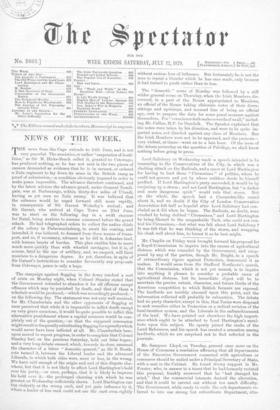Mr. Sampson Lloyd, on Tuesday, pressed once more on the
House of Commons a resolution affirming that all departments of the Executive Government connected with agriculture or commerce should be united under a Principal Secretary of State, with a seat in the Cabinet. He found strong support in Mr. Forster, who, in answer to a taunt that he had formerly resisted this proposal, frankly answered that ho "had changed his mind," that the commercial interests desired the alteration, and that it could be carried out without too much difficulty. The Government, while ready to unite the sub-departments re- ferred to into one strong but subordinate Department, alto- gether rejected the proposal to place it under a responsible Secretary of State. They used rather conventional arguments, Sir Stafford Northcote, for instance, alleging that commerce was better without official interference, but were quite in earnest, and through the First Lord of the Admiralty moved to leave out the words of the resolution demanding that the head of the new Department should be a Cabinet Minis- ter. The amendment was, however, defeated, by 71 to 65, and Mr. Lloyd's original resolution was carried intact, by 76 to 56. The vote, which was supported by seven or eight Con- servatives, is known to have the adhesion of many county Members who did not attend; but it is said that Government, considering the thin condition of the House, will not act on it. We have tried to show elsewhere that the resolution is of doubtful policy, but as it has been passed, the Government should take another vote. If a resolution of the House of Commons ceases to be final, we shall soon have no finality any- where.



































 Previous page
Previous page